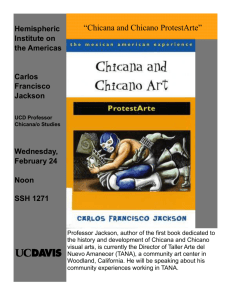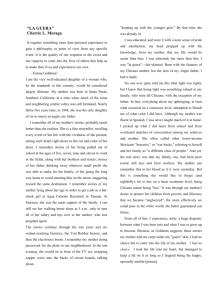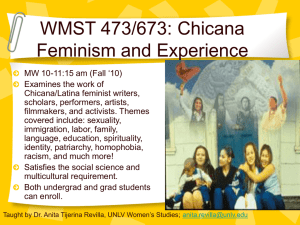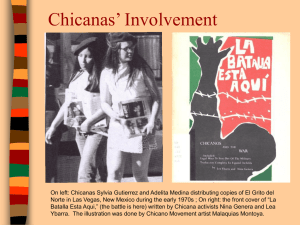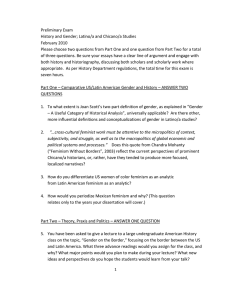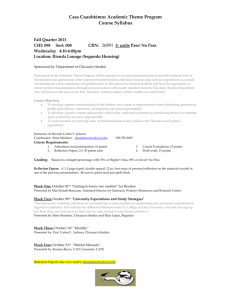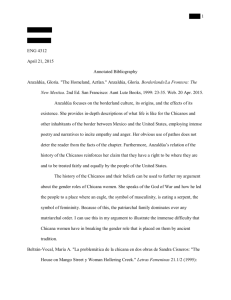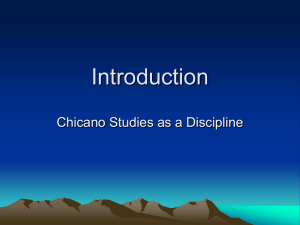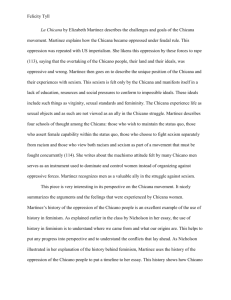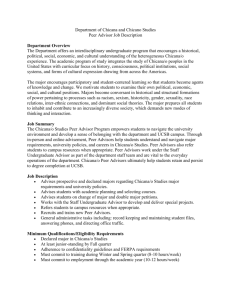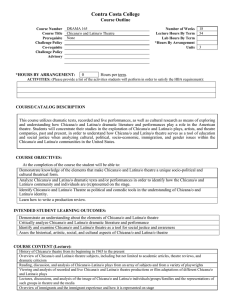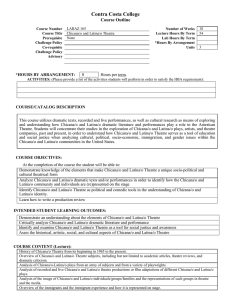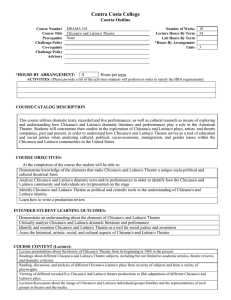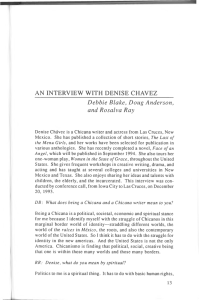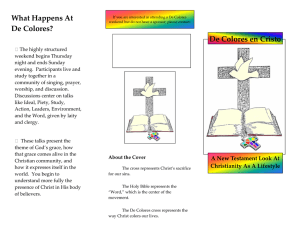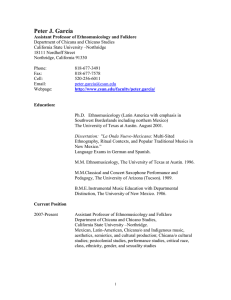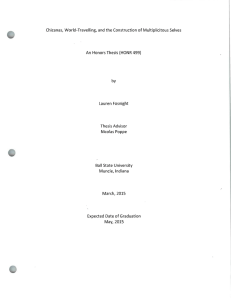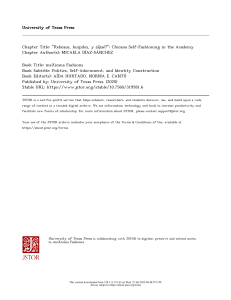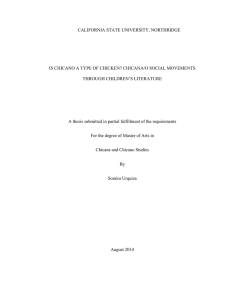Fall 2004
advertisement
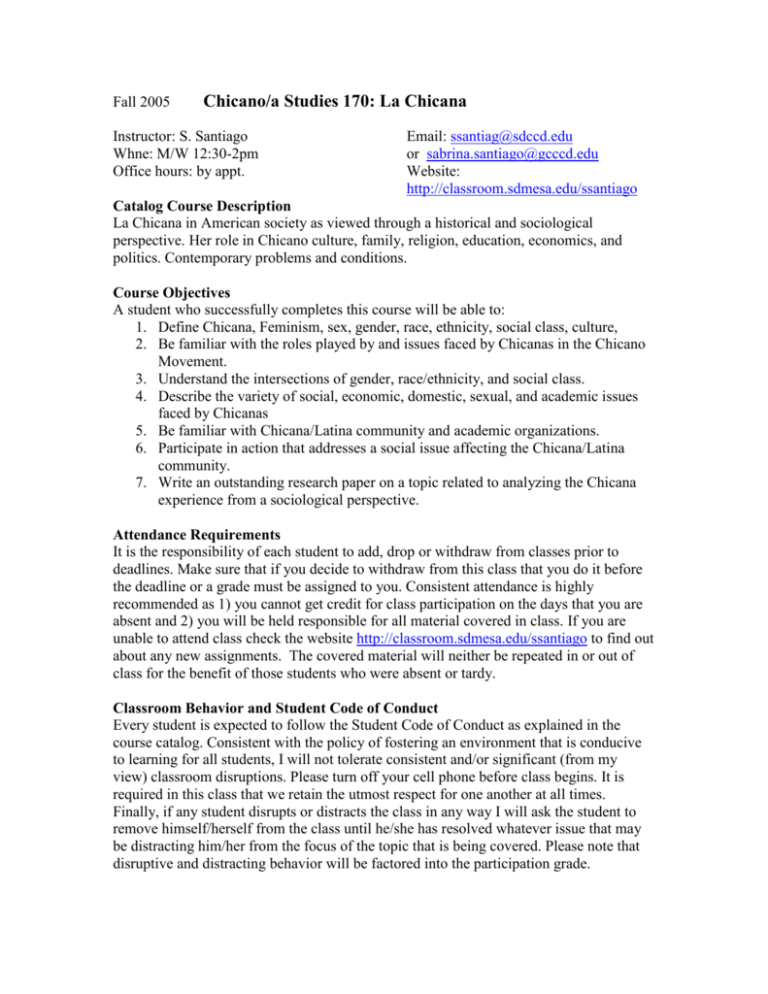
Fall 2005 Chicano/a Studies 170: La Chicana Instructor: S. Santiago Whne: M/W 12:30-2pm Office hours: by appt. Email: ssantiag@sdccd.edu or sabrina.santiago@gcccd.edu Website: http://classroom.sdmesa.edu/ssantiago Catalog Course Description La Chicana in American society as viewed through a historical and sociological perspective. Her role in Chicano culture, family, religion, education, economics, and politics. Contemporary problems and conditions. Course Objectives A student who successfully completes this course will be able to: 1. Define Chicana, Feminism, sex, gender, race, ethnicity, social class, culture, 2. Be familiar with the roles played by and issues faced by Chicanas in the Chicano Movement. 3. Understand the intersections of gender, race/ethnicity, and social class. 4. Describe the variety of social, economic, domestic, sexual, and academic issues faced by Chicanas 5. Be familiar with Chicana/Latina community and academic organizations. 6. Participate in action that addresses a social issue affecting the Chicana/Latina community. 7. Write an outstanding research paper on a topic related to analyzing the Chicana experience from a sociological perspective. Attendance Requirements It is the responsibility of each student to add, drop or withdraw from classes prior to deadlines. Make sure that if you decide to withdraw from this class that you do it before the deadline or a grade must be assigned to you. Consistent attendance is highly recommended as 1) you cannot get credit for class participation on the days that you are absent and 2) you will be held responsible for all material covered in class. If you are unable to attend class check the website http://classroom.sdmesa.edu/ssantiago to find out about any new assignments. The covered material will neither be repeated in or out of class for the benefit of those students who were absent or tardy. Classroom Behavior and Student Code of Conduct Every student is expected to follow the Student Code of Conduct as explained in the course catalog. Consistent with the policy of fostering an environment that is conducive to learning for all students, I will not tolerate consistent and/or significant (from my view) classroom disruptions. Please turn off your cell phone before class begins. It is required in this class that we retain the utmost respect for one another at all times. Finally, if any student disrupts or distracts the class in any way I will ask the student to remove himself/herself from the class until he/she has resolved whatever issue that may be distracting him/her from the focus of the topic that is being covered. Please note that disruptive and distracting behavior will be factored into the participation grade. Accommodation of Disability Students with disabilities who may need academic accommodations should notify the professor immediately. Required Text: Martinez, Elizabeth De Colores Means all of Us Martin, Patricia. Songs My Mother Sang to Me Exams: Exams are essay. No make-up exams will be given. Method of Evaluation: In-class Participation Assignments Midterm Final Research Paper 20% 20% 15% 20% 25% Written Assignments Grading Criteria A- Outstanding Writing. It jolts the reader, wakes her up, persuades her, pleases or delights her, makes her laugh or cry. Interests her in you and what you have to say. It keeps her attention. Makes her think the time spent reading is time well spent. There are only insignificant mechanical errors, if any. B- Good writing. No major mechanical errors. Fluent, clear, logical, and mature vocabulary. Sentence variety and maturity (often measured by complexity and subordination, though not necessarily or exclusively). The writing enhances the message (i.e. the manner in which you say it actually helps you state your point or argument). C- The writing will convey your meaning. It is not sufficiently advanced to enhance your meaning, nor is it so fault-ridden or unclear that it will detract from what you have to say. If the writing is sufficiently bad to take away from the effectiveness or what you want to say or to distract the reader from what you want to say, we cannot call it “satisfactory” and it will be below a C. D-Poor Writing, not satisfactory. There are such errors in mechanics, logic, sentence structure or organization that you do your ideas a disservice by writing them—or your ideas themselves need more careful thought. The writing interferes with your message and is likely to be a handicap to you in college courses if you fail to improve. F- Those who finish out the course and receive an F are being told not that they are vile, evil, or stupid but that their writing is so defective that it is unlikely they can succeed in courses where writing is required. They are being told that they need the course again. (Per Professor Neumeyer, SDSU) While I agree overall with Professor Neumeyer’s grading criteria overview above, be aware that in my opinion students do not do a disservice by writing down their ideas. To the contrary, writing down the ideas is the first step in writing a good paper. Then the writer goes back, rereads what he/she has written, revises, re-reads, revises, etc. until he/she has achieved the product that he/she desires. All students are encouraged to use the Writing Center for assistance with the assignments and the research paper. Please note that plagiarism --presenting someone else’s writing as your own—is cheating. The sanctions range from course failure to possible school expulsion. Also, you are expected to submit original work to this course. Papers submitted to other instructors will not be accepted. Research Paper Your research paper must address a topic related to the sociology of Chicanas. The paper should be 7-9 pages typed, excluding the bibliography. There is no penalty for writing more. You should have at least seven (7) sources cited in the body of the paper and listed in the bibliography. The research paper should have a thesis (or a statement about the main points of your paper). Your research objective is to find information from credible sources about the topic under investigation. The research paper should be written from a sociological perspective. A sociological perspective focuses on the impact of society on the individual. The sociological view will seek to understand the social structures (“the large scale patterns that persist over time”—Henslin, 2003) present in a particular society in order to understand the phenomenon. C. Wright Mills tells us in “The Promise of Sociology” that No study that does not come back to the problems of biography, of history, and of their intersections within a society has completed its intellectual journey. Whatever the specific problems of class social anlysts …those who have been imaginatively aware of the promise of their work have consistently asked three sorts of questions: (1) What is the structure of this particular society as a whole? What are its essential components, and how are they related to one another? How does it differ from other varieties of social order? Within it, what is the meaning of any particular feature for its continuance and for its change? (2) Where does this society stand in human history? What are the mechanics by which it is changing? What is its place within and its meaning for the development of humanity as a whole? How does any particular feature we are examining affect, and how is it affected by, the historical period in which it moves? And this period—what are its essential features? How does it differ from other periods? What are its characteristic ways of history-making? (3) What varieties of men and women now prevail in this society and in this period? And what varieties are coming to prevail? In what ways are they selected and formed, liberated and repressed, made sensitive and blunted? What kinds of “human nature” are revealed in the conduct and character we observe in this society in this period? And what is the meaning for “human nature” of each and every feature of the society we are examining? The three main theoretical perspectives in sociology are Functionalist, Conflict and Symbolic Interactionist. The Functionalist view examines and explains the functions of the social institutions in a society. The Conflict view looks at how power is distributed and who benefits from the existing societal arrangements. The Symbolic Interactionist view seeks to understand the meanings that are attached to the experiences of the individuals within a society. Ideally, your paper will incorporate all of these perspectives. The paper should be written in an academic manner and all sources of information should be given appropriate credit. Thus, if the research paper itself contains a citation it should also be listed in the bibliography. Double space sentences and use a 12-font. Paragraphs should be indented 5 spaces only. Please do not provide extra space in between paragraphs. Short quotes require quotation marks but long quotes should be indented, single spaced (see example above). A cover page with the title of the research should be provided. You may use any formal bibliographic style (MLA, APA, Chicago, etc.). If you do not know how to put tighter a bibliography please see your librarian for help.. Finally, I am willing to review your “draft(s)” any time before the due date. The earlier you submit the paper to me, the more time I can spend reviewing it the earlier I can return it to you. Course Schedule 8/30 Introduction to course 9/1 “La Prieta” by Gloria Anzaldua in A Bridge Called My Back 9/13-15 “La Guera” by Cherrie Moraga in A Bridge Called My Back “Brownness” by Andrea Canaan in A Bridge Called My Back 9/20 “White Privilege: Unpacking the Invisible Knapsack,” Peggy McIntosh “Patriarchy, the System: An It, Not a He, a Them or an Us,” Allan Johnson “The Myth of the Latin Woman: I Just Met a Girl Named Maria,” Judith Ortiz Cofer + student reading selections 9/22 9/27-29 De Colores Means All of Us by Elizabeth Martinez 10/4-6 De Colores Means All of Us 10/11-13 De Colores Means All of Us + student reading selections 10/18-20 Midterm Exam 10/25-27 “Global Woman,” Barbara Ehrenreich & Arlie Russell Hochschild “America’s Dirty Work: Migrant Maids and Modern-Day Slavery,” Joy M. Zarembka “Does Silencio = Muerte?: Notes on Translating the AIDS Epidemic,” Dr.Rafael Campo 11/1-3 “I’m Not Fat, I’m Latina,” Christy Haubegger “A Way Outa No Way”: Eating Problems among African American, Latina, and White Women,” Becky W. Thompson + student selections 11/8-10 “La Conciencia de la Mestiza” by Gloria Anzaldua “Chicana Feminist Literature:: A Re-vision Through Malintzin/or Malintzin: Putting the Flesh Back on the Object” by Norma Alarcon “Mexican American Women, Grassroots Community Activists” 11/15-17 Songs My Mother Sang to Me, “Foreword” & pages 1-75 11/22-24 Songs My Mother Sang to Me, p. 79-141 11/29- 12/1 Songs My Mother Sang to Me, p.145-216 12/6-8 Research Paper Due/Research Presentations 12/13 12/15 Final Review Final Exam
